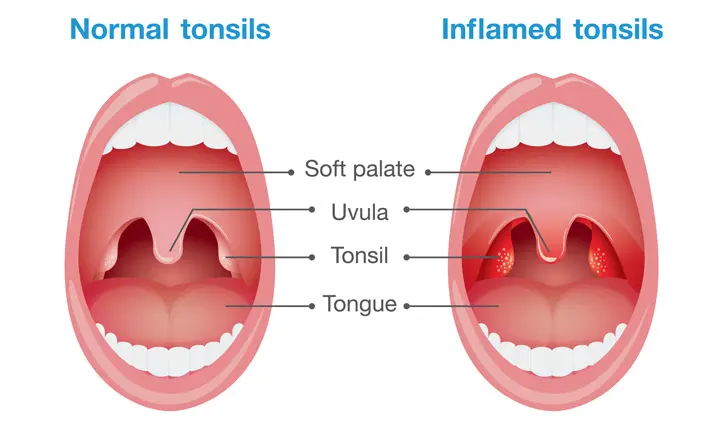What are your tonsils?
Your tonsils are areas of tissue at the back of your throat containing lymphatic cells. You actually have 3 sets of tonsils: the lingual tonsils at the base of your tongue, the nasopharyngeal tonsils, known as adenoids, and the palatine tonsils at the opening of your throat. The 2 palatine tonsils are what most people refer to when they talk about your tonsils.
Your tonsils have many functions, including:
- Filtering bacteria and viruses
- Producing antibodies
They are your body's first defence mechanism against diseases that might enter your body through your mouth. However, this also makes them susceptible to illness.
What is tonsillitis?
When your tonsils become red, sore and inflamed due to an infection, it is known as tonsillitis. Many different viruses and bacteria can cause tonsillitis including influenza virus, Epstein-Barr, herpes simplex virus and adenovirus.
As well as pain and redness, other symptoms include:
- White or yellow pus on the tonsils
- Blisters or ulcers
- Headache
- Swollen tonsils leading to obstruction of the airways
- Halitosis, or bad breath
Tonsillitis can be acute, which refers to a singular episode of tonsillitis, or recurring, which means it keeps coming back. Your doctor will initially treat your tonsillitis with minimal intervention, which may involve a course of antibiotics.
Why might you need a tonsillectomy?
A tonsillectomy is a surgical procedure to remove your tonsils. Your doctor might recommend a tonsillectomy if you have one or more of the following issues:
- You have recurring tonsillitis
- You struggle with breathing
- You suffer from sleep apnoea, a condition where you stop breathing periodically during sleep
- Your tonsils bleed or frequently trap food debris and foreign bodies like fish bones
- You suffer from halitosis (bad breath)
- You snore heavily
- Other illnesses such as cancer of your tonsils
- You have had a bad infection of the space next to the tonsils, called a quinsy (also known as peritonsillar abscess)
Because any type of surgery comes with risks, your doctor will only refer you for surgery if it is necessary, and your tonsillitis is severe enough.
What to expect from a tonsillectomy
Before your surgery, your doctor will ask you to do some things to prepare. You will probably be asked to stop taking certain medication that may affect the surgery and fast the day before. You will also need to organise hospital paperwork and designate someone to collect you after your procedure is complete.
Tonsillectomy surgery itself is fairly straightforward. Your tonsils will be removed, although the technique used for removal varies. Your tonsils can be cut out with a scalpel, or removed using laser, ultrasound, cauterisation or freezing the tissue. No matter the method, it is usually a quick procedure. Due to the close proximity to your airways and the invasive location, tonsillectomies do require a general anaesthetic. There are risks to consider, and complications include:
- Swelling
- Bleeding
- Infection
- Reaction to the anaesthetic
The recovery for a tonsillectomy is fairly rapid. You will probably experience pain for at least the first few days, and your doctor may recommend that you take a week off of work, to get plenty of rest. You can also do the following to aid your recovery:
- Drink plenty of fluids
- Ingest only liquid foods like soup to begin with
- Gradually introduce soft foods and then solids
- Avoid too much talking
- Take prescribed medication
- Avoid smoking and alcohol
- Avoid very hot liquids and spicy foods for the first 2 weeks
Remember, you should go straight to the Urgent Care Centre (UCC) department if you experience a high fever, trouble breathing, or excessive bleeding during your recovery.
The benefits of a tonsillectomy
Removing your tonsils is very beneficial if you are often unwell with tonsillitis. Tonsillitis is more common in children, and the breathing problems it causes can negatively impact on a child's ability to concentrate at school and participate in normal activities. In adults, recurrent tonsillitis can be frustrating, and in severe cases of obstructive sleep apnoea as a result of enlarged tonsils, there can be multiple medical problems arising such as glaucoma (eye disease due to high pressure within the eye) and heart problems.
Removing your tonsils can help with:
- Eliminating the occurrence of tonsillitis
- Eliminating or minimising the occurrence of sleep apnoea
- Improving respiratory function
- Reducing the amount you snore
- Improving your swallowing
- Preventing food debris and foreign bodies from getting lodged in your tonsils
- Eliminating bad breath
Should you get a tonsillectomy?
If you suffer with recurring tonsillitis you should see your doctor or an ENT specialist for help and guidance about your treatment options and eligibility for surgery.
The improvement on your quality of life can be dramatic, so it's important to prioritise treatment if you need it.















